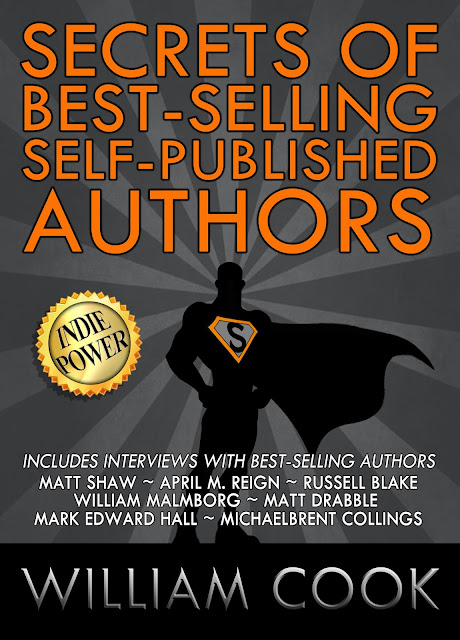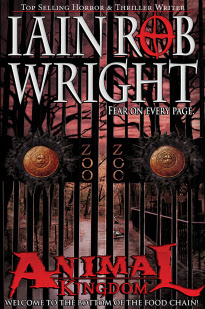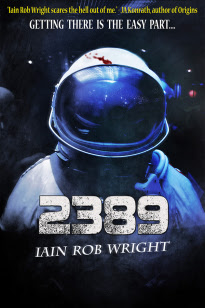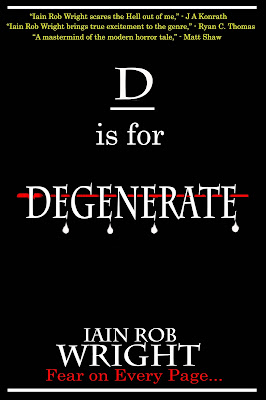Iain Rob Wright, best-selling Indie author has kindly granted me permission to repost this interesting and inspirational article about the pros and cons of self-publishing (in 2016). Please read and make sure to check out Iain's great website for lots more articles and resources for indie authors.
Should you self-publish in 2016?
Yes, so long as you set
realistic expectations. Wanting too much too fast will deflate your
passion quicker than a monkey in your underwear drawer (I have no idea
what that means).
So, what is my story of self-publishing? In
early 2011 I was in my 5th or 6th year of being a mobile phone salesman
in a shop. For the last few years, I had flitted between companies and
into and out of management positions (I was never any good at cracking
the whip). I was constantly stressed and miserable–mostly because I
loathed what I did. Everyday, I grew more and more irritable with the
public, and a little bit lazier with my efforts to sell to them. Every
morning, I wanted to cry rather than go in and face another day. And
don’t even get me started on the immoral area managers who expected
results at any cost (Simon Little I am calling you out, bitch!) and felt
it was right to treat staff like dirt. Phones4U went bust a couple of
years ago and I can’t say I wasn’t a little pleased to see such a
dishonest company fall. By that time I was already earning a shit load
of cash doing what I love. Charlie, I was winning!

I
walked out of my job in May 2011 after being spoken to like dirt for
the 100th time that week by a manager. I just sauntered off the shop
floor and never came back. It felt good. My wife (although girlfriend
then) was not pleased. But she’s also my best friend so she didn’t force
me to go back (that would have been embarrassing). In my desperation, I
said I would try and get that book I’d been working on published (it
was my dream). The plan was to send it to an agent, but I was already
well aware of the lottery of trying to get published. Fat dudes with
goatees don’t generally get deals with big London book magnates. What
other choice did I have though? I was Sean Bean in the cells of the Red
Keep. I needed a way out, man.
My frantic googling threw me upon
KDP and the means to self-publish (I always thought it meant flogging
books out of a car boot). The more I read about the scheme, the more I
did a sex-wee in my pants. It seemed too good to be true–but it was a
chance! Joffrey might just let me live! My wife (then girlfriend) gave
me 6 months to earn £1000 a month from self-publishing, or I would have
to get a full-time job again (something that terrified me as at that
point I only had experience as a salesman and retail manager). So I
cleaned up The Final Winter
and published it on KDP. I did all the usual first-time author stuff
and begged people on Facebook to check it out. And fortunately some of
them did–people who still support me to this day. I made a few quid. It
was nice. Even more wonderful was that I got some great reviews. I was a
horror fan and I was pleasing other horror fans.
The next month I
sold a few more copies. The month after that, even more. My earnings in
that dreaded month 6 deadline? £1600. Booya! I had met my goal and beat
it by 60%. What the fuck just happened? I just published a book and
made the same as I did in my former day job, right? Fuck yeah, I did!
So
I wrote another book as quickly as I could. With my sudden success, I
thought I would be an exciting prospect to a publisher. Animal Kingdom
ended up with a small American Press. Woohoo! They did professional
artwork and everything! While that was being handled, I wrote my third
book, ASBO (inspired by Intensity by James Newman). I self-published that book and damned if it didn’t fly. My first month earnings for ASBO?
£3800. Say what? With the earnings I made in May 2012 (exactly a year
after I published my first book) I brought a new flatscreen tv and a
sofa. Damn straight!
At the rate I was going, I would be a
millionaire in a few years, right? Well, no, because the bottom fell out
of KDP. Of course it did. Nothing lasts forever. What I didn’t know at
the time was that I had lucked out by being one of the first guys to
turn up at a goldrush. In 2011 Amazon had less than a million
self-published books. Now it has several million. That’s a whole lot
more competition. Also, customers were used to high prices, which made
my books seem like a bargain. Now customers are a little more jaded and
ignore ‘bargain books’. Things changed. They always do. Self-publishing
is tougher now than it was then, and if I had tried to get my start in
2016 I would have had a completely different experience (maybe even
failed).
Despite the decline, I remained a full-time writer by
learning how to survive in the current climate. I kept new releases
coming which allowed me to benefit from my existing customer-base, and I
branched out into paperbacks and audiobooks. I looked at foreign
editions too. I built a darn-tootin website and started signing people
up to my email list with a great free book offer (see here). I started advertising and running competitions. Then I started–Yikes, this sounds a lot like a business, doesn’t it?
Yep.
The
best advice I can give to a self-publisher today is to think of
themselves as business people, not writers. Writing books is the easy
part to get right. Read a few books about craft, practice, and keep
producing content. The tricky stuff is getting people to pick your book
over someone else’s, or even getting someone to see it in the first
place.
You need to face the same problems that all businesses do, is what I am saying.
So is it worth it?
Here are the reasons not:
- Success takes a LOT of time and effort
- You will need to learn a shitload of new skills from web design and blogging to marketing and branding
- No one will hold your hand
- It will consume your life. Check with your other half!
- You might have to lose a little money first
- Traditional authors will be mean to you
- You need to do it all yourself
- Except for editing and artwork which you need to purchase with your own coin
- You might fail anyway
So,
in a nutshell, I am trying to say that the downside to self-publishing
is that it is hard work with possibly little reward. You should
understand that your chances of quitting your day job in year 1 are slim
today, but that isn’t what success should be measured by. You should
set realistic goals and concentrate only on meeting them one at a time.
Your first goal should be to sell 1 book to a stranger. Goal 2 should be
to sell enough books to pay your cell phone bill. Then your car loan.
Then, maybe, contribute towards a holiday. If you earn a $100 dollars a
month and still have to work fulltime, then that’s a pay rise at least,
right? Your life is better. You can afford to buy more tacos. Mmmm,
tacos.
Geez-louise Iain, that’s sounds like some gash darned hard
work. Is it really so bad? No, of course not.
Here are some of the
reason you SHOULD self-publish:
- You are your own asshole of a boss
- Writing is what you love
- You will make lots of cool friends
- You get to do everything just how you want
- Hard work will pay off and you decide your fate
- You get to tell the God of Death, NOT TODAY.
- It’s easier to make money than any other publishing route (70% royalties, yo)
- It’s hella fun
- The fans you make are your own and can become your buddies for life
- No one can pick you up and drop you (*cough* big publishers)
- You get to write exactly what you want to write (leprechaun porn is life)
- Make your own hours and put in whatever time you decide
- See the money you are earning right away and get it in your bank account quickly
- If you nail it, publishers might come running to you!
- No resume or achievements required
- Earning potential is millions! Good luck!
While
my above points might be vague, the summary is that self-publishing has
the potential to change your life. Work hard and grow your business a
little bit at a time and there is no reason you can’t make writing your
living. Things change and you need to be ready to change with them.
Competition will grow, so you need to stand out. Readers are hard to
gain, so don’t lose them with sloppy editing or dodgy formatting. Just
remember to EARN – EDITING ARTWORK FORMATTING NEXT (as in get the next
book finished). Although you should start at the beginning and work
towards your goals, getting your first book as professional as can be is
a must. Work quick, but don’t work sloppy. And never drive angry, but
that’s just good advice in general. Should you self-publish in 2016?
Hell yes.
Anyway, if you are looking for more detailed help on
what to do and how, then keep checking back as I will be posting many
articles in 2016 designed to help the wily author. In the meantime, here are some books I recommend you read to get started: The Newbie’s Guide to Publishing (Everything A Writer Needs To Know), On Writing, Write Publish Repeat, How to Make a Living Writing.
Toodles, Iain.
***********************************
At the moment, readers can take
advantage of a great offer on Iain's website. If you sign up to his no-spam
newsletter you will get free copies of his great horror ebooks: The Picture Frame, Animal Kingdom,
2389, Sea Sick, and D is for Degenerate. Five books for free plus all the other regular resources and articles related to self-publishing.
His website address
is: www.iainrobwright.com or you can
go immediately to the sign up form here: http://eepurl.com/baDkyT
You can find Iain's fantastic selection of books via Amazon here.
Also, make sure you check out the recent interview we did with Iain where he generously shares his best tips on how you can improve your sales, marketing and author platform.








